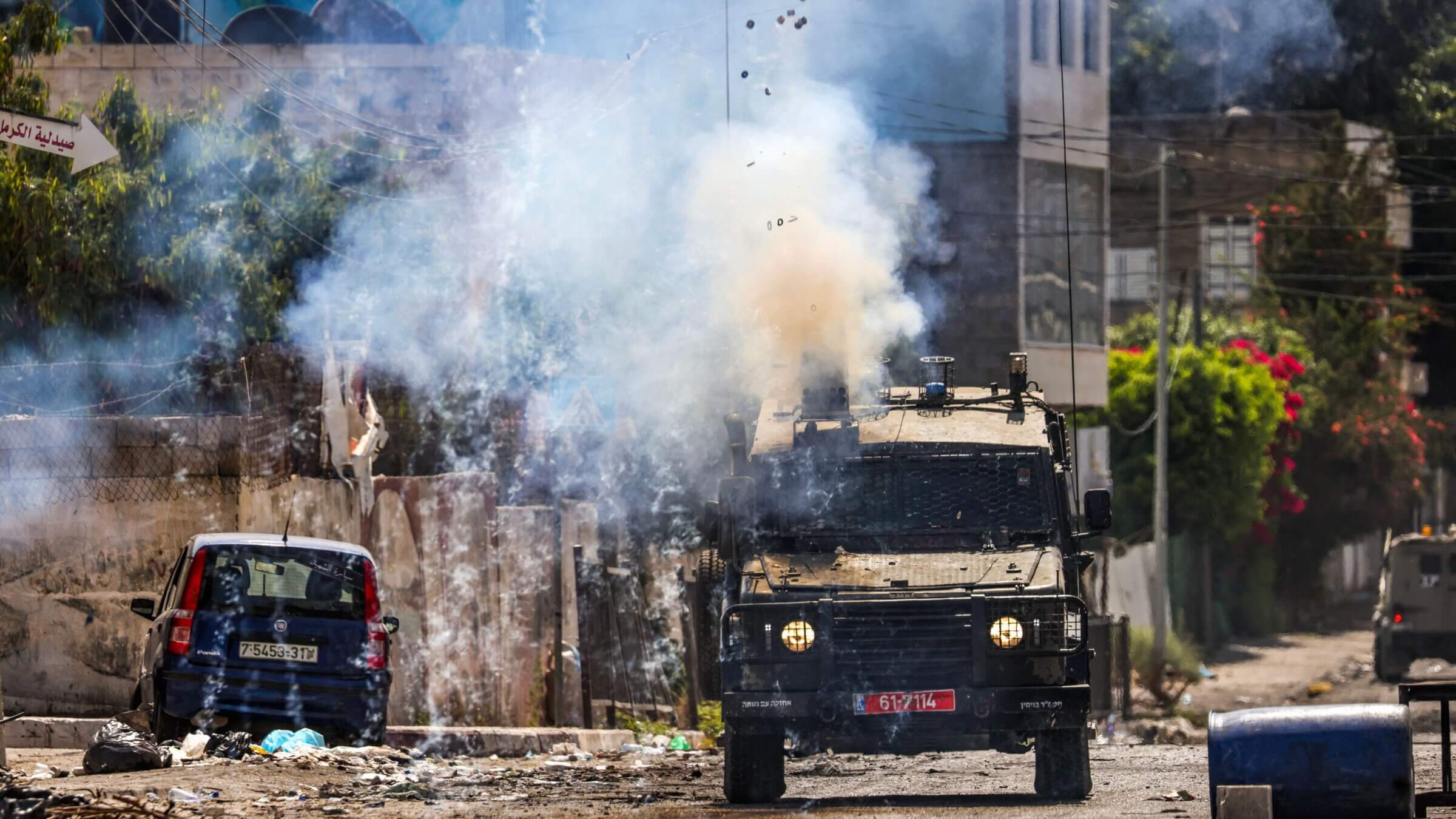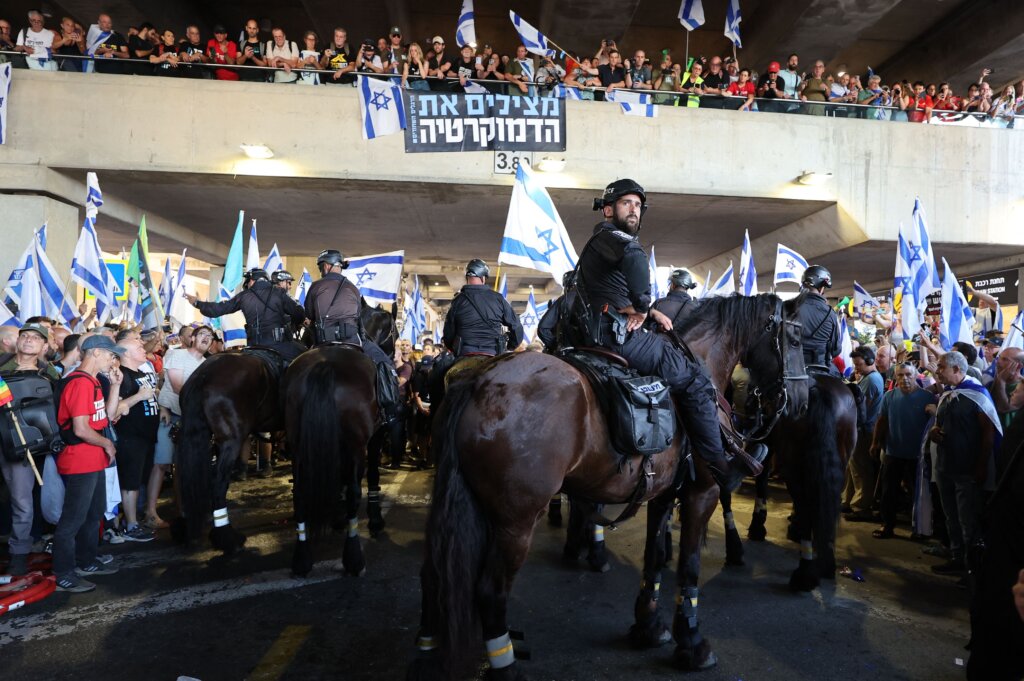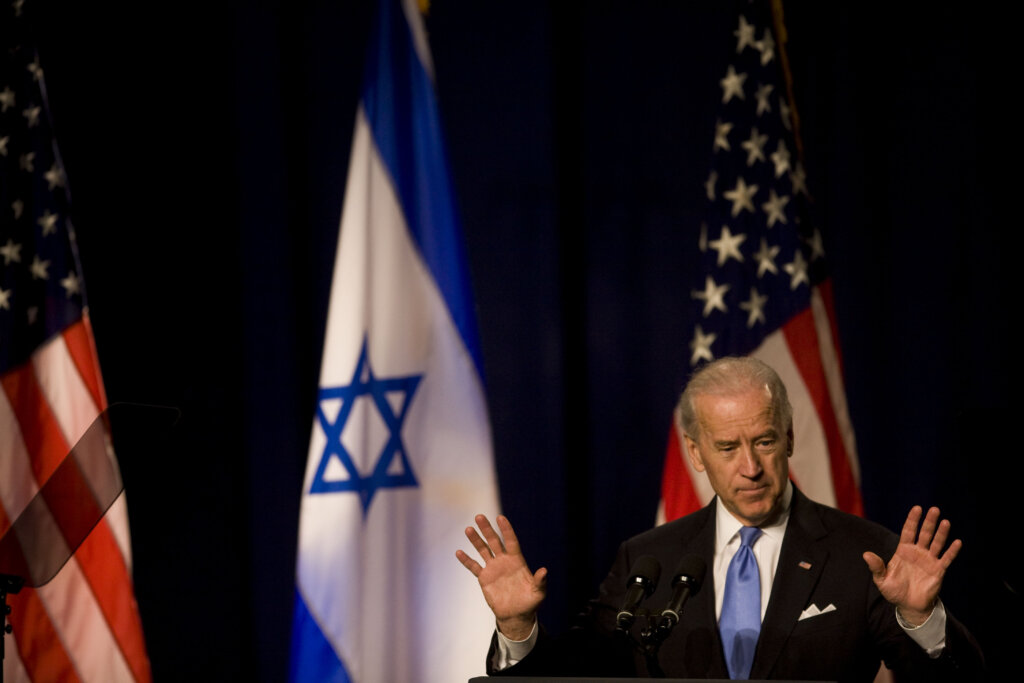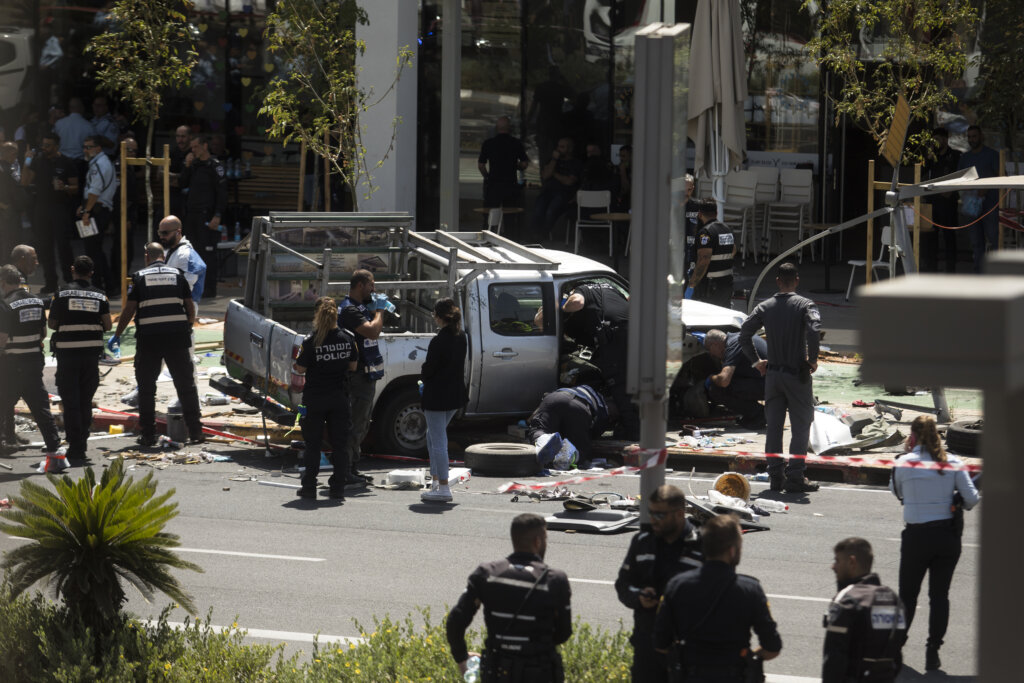What’s happening in Jenin is a dire warning for Israel’s future
The battle for Jenin is anything but business as usual. It is a reflection of the many fissures tearing Israel apart

Israeli soldiers fire tear gas canisters from an armored vehicle during an ongoing military operation in the occupied West Bank city of Jenin on July 4, 2023 Photo by Ronaldo Schemidt/AFP via Getty Images
At first glance, there appears to be nothing unusual about Israel’s military action against terrorist strongholds in Jenin — that is, apart from its size.
While Israel has undertaken many smaller operations in Judea and Samaria, this is the largest since Defensive Shield in 2002, when Prime Minister Ariel Sharon ordered the reoccupation of Palestinian cities.
His decision followed the first two years of the Second Intifada, in which hundreds of Israelis were killed by suicide bombers. Today’s operation, though, comes in response to the murder of 24 Israelis since the beginning of the year, with many of the perpetrators originating from or escaping to Jenin.
In contrast to the tens of thousands of Israeli troops who took part in Defensive Shield, the 2,000 soldiers sent into Jenin would seem proportionate to the threat. There is nothing unusual about what is unofficially being called Operation Home and Garden (Bayyit v’Gan, a reference to Jenin’s Biblical name, Ganim, “Gardens”) — at least superficially.
In fact, the battle for Jenin is anything but business as usual. It is, rather, a reflection of the many fissures tearing Israel apart.
Divided Jerusalem

The fighting in Jenin coincided with the Independence Day gala held by the U.S. embassy in Jerusalem. Driving from our Jaffa home to that event, my partner and I found ourselves trapped in a two-hour traffic jam caused by some 15,000 protesters intent on shutting down Ben-Gurion airport.
Israeli flags and posters branding Prime Minister Benjamin Netanyahu a criminal clustered over Highway 1. Such protests have been going on for months as the coalition continues to press forward with legislation which, while effecting a much-needed reform of Israel’s Supreme Court, would remove any effective check on the government and eliminate judicial review, the pillar of almost every democracy.
Efforts to block this initiative have resulted in the first-time-ever politicization of the army, with thousands of reservists refusing to report for duty. For the first time, the Histadrut, Israel’s main labor union, went on strike — not for better wages, but in opposition to the proposed laws.
The airport has also been closed, albeit only for the second time — the first was by Hamas rockets in 2014. Such precedents are portentous for Israel which, under a future center-left government, might find itself confronted by an IDF in which half of the officers wear kippot and by workers who are in large measure right-wing. The airport could again be closed by opponents, say, of territorial compromise.
Daylight between the United States and Israel

The gala was also unusual, held in the shadow of President Biden’s public refusal to invite Netanyahu to the White House. Justified by the administration’s concern for Israeli democracy, the policy also stems from its abhorrence of the racist members of Netanyahu’s coalition and its opposition to Israeli settlement-building in the West Bank.
Biden also remembers the crisis triggered in 2010, when, during his vice-presidential visit to Israel, elements in the Netanyahu government announced a building project in the East Jerusalem neighborhood of Ramat Shlomo. Today, when Netanyahu exercises even less control over his ministers, they could spark a far greater crisis — backing large-scale settler violence, for example — while the prime minister sits in the Oval Office.
By snubbing Bibi, Biden has sent a clear message to the region of strains in the U.S.-Israel alliance, emboldening both countries’ enemies.
The friction has also impelled Netanyahu to accept an invitation to visit China at a time when opposition to China represents a rare bipartisan consensus in Congress. Though Netanyahu addressed the gala, extolling America and Israel’s common democratic values, its longest-ever guest list did not include Bezalel Smotrich and Itamar Ben-Givr, his two most radical ministers.
All of these factors served to set Operation Home and Garden apart from its predecessors. Though few Israelis would question its justification — opposition heads Benny Gantz and Yair Lapid both backed it — many ignored the government’s calls to suspend the protests during the operation. The government, conversely, rebuffed the opposition’s request to suspend the legislation while the fighting continued. Not since 1983, when hundreds of thousands of Israelis took to the streets to protest Israel’s role in the Sabra and Shatila massacre, has the country been so divided in wartime.
The Biden administration, meanwhile, refrained from reiterating, as it did nightly during the 2021 clash with Gaza, that Israel has the right to defend itself. Instead, the State Department, after briefly acknowledging the “security challenges facing Israel and the Palestinian Authority,” called for an end to the “cycle of violence” and “for all parties to de-escalate.”
The European Union, together with Egypt, Jordan, Morocco, Saudi Arabia and the United Arab Emirates, all condemned Israel’s action. Unlike in 2002, when Israel enjoyed steadfast backing from President George W. Bush, Israel now confronts terror on its own.
The future of the West Bank

Which brings us to Jenin. Conventional wisdom holds that the growth of Hamas and Islamic Jihad cells is the direct result of the breakdown of the Palestinian Authority in Northern Samaria.
Another school, though, holds that the PA has intentionally allowed the terrorists to thrive in order to secure concessions from Israel and condemn it for war crimes. Irrespective, Jenin offers a window into a future in which the Palestinian Authority, post its aged president Mahmoud Abbas, essentially disintegrates and Israel, shorn of American and international support, must grapple with the chaos alone.
On the surface, Home and Garden is much like similar operations in the past, especially Defensive Shield. Yet, behind the familiar scenes of soldiers fighting house to house and attack helicopters firing missiles at terrorist targets, lies a very different situation.
It is far from certain that the current government, which contains relatively few veterans and which many Israelis blame for provoking the Palestinians, would have the legitimacy to launch a Defensive Shield-scale operation. Meanwhile, terrorist attacks such as the one that struck Tel Aviv, wounding nine, while I wrote this article, are bound to recur.
If, in the past, the greatest threats facing Israel were external, now they are both outside and within our society.
Increasingly, our failure to unite internally — and to convince the world of our case — will impair our ability to defend ourselves against dangers that will surely mount.
Listen to That Jewish News Show, a smart and thoughtful look at the week in Jewish news from the journalists at the Forward, now available on Apple and Spotify:















